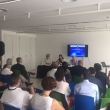Supporting the STI dialogue between Latin America, the Caribbean and the EU
22. Nov 2017
For the last time the ALCUE NET consortium came together on November 14-15 in Buenos Aires, Argentina. The Ministry for Science, Technology and Productive Innovation (MinCyT) hosted the meeting and, together with the project partners, organised follow up events to celebrate 20 years of Marie Skłodowska-Curie actions and to inform about H2020 and its openness to the world, with special focus on targeted opportunities for countries of the Community of Latin American and Caribbean states (CELAC). While the first two days were used to wrap up the project activities and to discuss further possibilities for maintaining the networks established, the following two days were used to engage with local researchers and institutions and to promote CELAC participation in H2020.
During the last 4 ½ years the FP7 INCO project ALCUE NET was a crucial actor in supporting the bi-regional policy dialogue process on science, technology and innovation, while fostering partnership and capacity building to jointly address social challenges. ZSI was in charge of the impact monitoring of the project and presented the final report on impact monitoring and outreach assessment at the consortium meeting in Buenos Aires. An important part of the impact monitoring were the support actions for the CELAC National Contact Point (NCP) network. For this purpose two surveys were conducted in all countries with CELAC NCPs that gathered the responses of 180 NCPs. The results presented at the event will soon be available at the ALCUE NET website.
The subsequent H2020 information events were used to engage with CELAC researchers and institutions and to share the rich experience of ZSI in participation in European Framework programme projects. Presentations were held by project partners and representatives of the European Commission.
















































